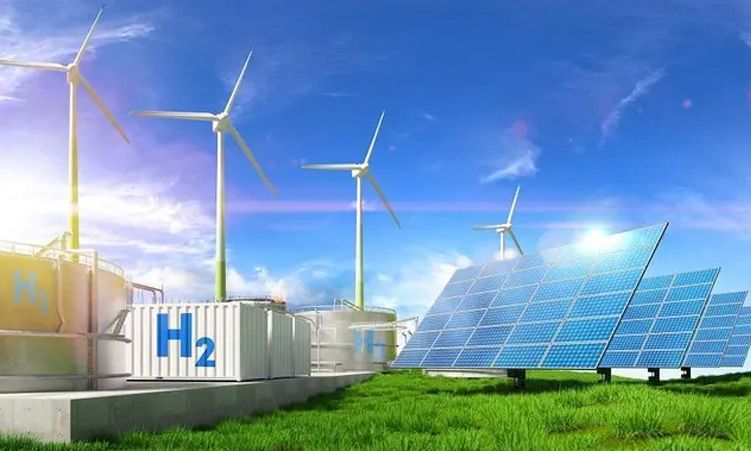PROBLEMS with malfunctioning equipment and sloppy contractors continue to dog the effective running of the Goreangab Water Reclamation Works.This time, the City of Windhoek has decided to stand firm on the termination of its contract with American company Oxygen Generating Systems International (OGSI).
The company was contracted to replace the original oxygen-generating plant, which the municipality says has failed to produce oxygen at the specified volume and purity on a sustainable basis. This is the second time the municipality is taking issue with contractors on the reclamation works.Last year, it launched a High Court challenge against South African company DB Thermal for N$37,3 million for defects in the design of the plant.The City claims that the new plant is failing to produce the expected 21 000 cubic metres of purified water a day.The case is still pending.The reclamation plant was commissioned in August 2002 as a supplementary potable water source for the city at a cost of N$100 million.One component of the reclamation process is the application of ozone.An oxygen-generating plant was installed at the plant to produce the feed gas for the ozone generator.The reclamation-plant project was originally funded by the German development bank, KfW.Because of the failure of the original plant, the retention guarantee of N$6,2 million was called up and used to replace the oxygen plant.According to the City, OGSI has failed to comply with the specifications of the original contract by missing the scheduled start of the 28-day trial run, failing the trial run and subsequently abandoning the site.In the municipality’s view, OGSI exceeded the time for completion of its work and has reached the maximum amount of penalties payable.According to its calculations, the City reckons that the total outstanding amount due to OGSI by the City has become less than the delay penalties it owes the City.With the City having withheld payment of the contractor, OGSI refused to render any information or service until more money was released.OGSI still refused to return to the site in July after the management committee agreed to waive the delay penalties, and still demanded payment from the municipality.The City terminated the contract with OGSI in September on the grounds of non-performance.OGSI then agreed to return to the site to solve the technical design and operational issues and the City of Windhoek gave them another opportunity to get the oxygen plant working by the end of October.But with OGSI not meeting a seven-day deadline to present the City with a programme on how it planned to resolve the problems, the City again moved to terminate the contract at the end of October.OGSI refused to accept the termination letter, claiming that WINGOC (the municipality’s operator of the Goreangab Reclamation Plant) said that the installed pressure-switch absorption (PSA) plant was meeting guarantee values.Although WINGOC acknowledged that it was able to improve the performance of the plant, the guarantee values were still not met, and the plant was still plagued by problems.The plant continues to be unreliable – at one time with 19 stoppages in as many days.OGSI lodged a complaint with the US Government against the City of Windhoek, and local embassy representatives met with the municipality on the issue.”Due to significant cost to the City of Windhoek for the Goreangab Works and Reclamation Plant not being able to run at full capacity and severe procrastination on behalf of the contractor, the City of Windhoek [has] decided to uphold the termination despite threats and allegations by the contractor,” the City resolved at last week’s council meeting.The City appointed a British specialist from the company OPAT to get the plant fully operational again and the municipality is currently implementing the changes to the existing plant configuration.This is the second time the municipality is taking issue with contractors on the reclamation works.Last year, it launched a High Court challenge against South African company DB Thermal for N$37,3 million for defects in the design of the plant.The City claims that the new plant is failing to produce the expected 21 000 cubic metres of purified water a day.The case is still pending.The reclamation plant was commissioned in August 2002 as a supplementary potable water source for the city at a cost of N$100 million. One component of the reclamation process is the application of ozone.An oxygen-generating plant was installed at the plant to produce the feed gas for the ozone generator.The reclamation-plant project was originally funded by the German development bank, KfW.Because of the failure of the original plant, the retention guarantee of N$6,2 million was called up and used to replace the oxygen plant.According to the City, OGSI has failed to comply with the specifications of the original contract by missing the scheduled start of the 28-day trial run, failing the trial run and subsequently abandoning the site.In the municipality’s view, OGSI exceeded the time for completion of its work and has reached the maximum amount of penalties payable.According to its calculations, the City reckons that the total outstanding amount due to OGSI by the City has become less than the delay penalties it owes the City.With the City having withheld payment of the contractor, OGSI refused to render any information or service until more money was released.OGSI still refused to return to the site in July after the management committee agreed to waive the delay penalties, and still demanded payment from the municipality.The City terminated the contract with OGSI in September on the grounds of non-performance.OGSI then agreed to return to the site to solve the technical design and operational issues and the City of Windhoek gave them another opportunity to get the oxygen plant working by the end of October.But with OGSI not meeting a seven-day deadline to present the City with a programme on how it planned to resolve the problems, the City again moved to terminate the contract at the end of October.OGSI refused to accept the termination letter, claiming that WINGOC (the municipality’s operator of the Goreangab Reclamation Plant) said that the installed pressure-switch absorption (PSA) plant was meeting guarantee values.Although WINGOC acknowledged that it was able to improve the performance of the plant, the guarantee values were still not met, and the plant was still plagued by problems.The plant continues to be unreliable – at one time with 19 stoppages in as many days.OGSI lodged a complaint with the US Government against the City of Windhoek, and local embassy representatives met with the municipality on the issue.”Due to significant cost to the City of Windhoek for the Goreangab Works and Reclamation Plant not being able to run at full capacity and severe procrastination on behalf of the contractor, the City of Windhoek [has] decided to uphold the termination despite threats and allegations by the contractor,” the City resolved at last week’s council meeting.The City appointed a British specialist from the company OPAT to get the plant fully operational again and the municipality is currently implementing the changes to the existing plant configuration.
Stay informed with The Namibian – your source for credible journalism. Get in-depth reporting and opinions for
only N$85 a month. Invest in journalism, invest in democracy –
Subscribe Now!










